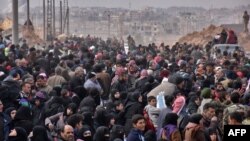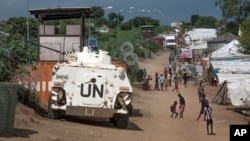The United Nations is launching a record appeal of $22.2 billion to provide life-saving assistance for nearly 93 million of the world’s most vulnerable people in 33 countries.
At a gathering of international donors in Geneva, the U.N. said the world is facing the biggest humanitarian crisis since World War II. It said more than 128 million people affected by conflict, displacement and natural disasters need urgent support.
Of this number, the U.N. is appealing for money to help nearly 93 million of the most acutely vulnerable people in need of immediate life-saving assistance. U.N. Undersecretary-General for Humanitarian Affairs Stephen O’Brien says money from this multi-billion-dollar appeal will make a vital difference in the lives of tens of millions of people.
“It will translate into life-saving food assistance to people on the brink of starvation in the Lake Chad Basin and South Sudan. It will provide protection for the most vulnerable people in Syria, in Iraq, and in Yemen. And, it will enable children, education for children whose schooling is disrupted by El Nino among many other responses,” O’Brien said.
The crisis in Syria is the United Nations' biggest humanitarian concern, with plans to help nearly 13 million people who are displaced within the country or living as refugees in neighboring countries. O’Brien said humanitarian assistance is only a stop-gap measure. He told VOA a desperately needed political solution is the only thing that will ultimately bring to an end the suffering of the Syrian people who have been at war for more than five years.
“Humanitarians can do no more than fill the gaps of people who either need food or shelter or medicine or treatments or evacuation or who need access to water and sanitation and hygiene and other non-food items in order simply to survive,” O’Brien said.
Besides Syria, the United Nations cites Yemen, South Sudan and Nigeria as among the greatest drivers of humanitarian needs, prompting large-scale displacements within and outside these countries. Indeed, the United Nations notes that about 1.2 million people - 80 percent of them women and children - have fled South Sudan, making this the biggest refugee movement in Africa.





